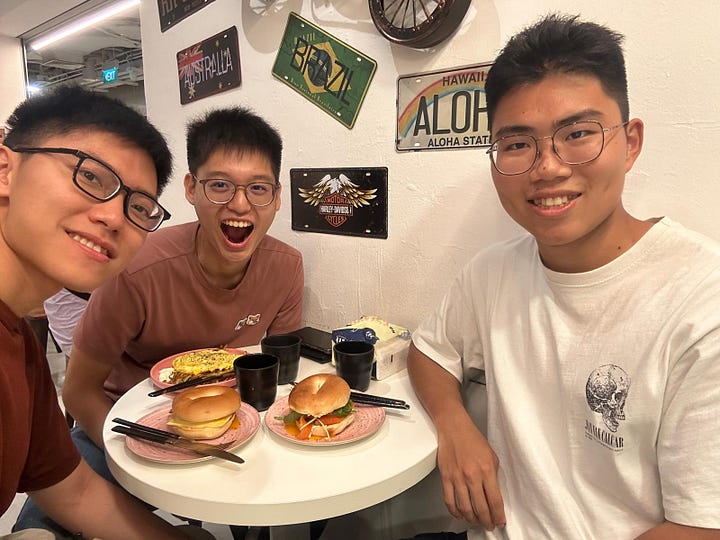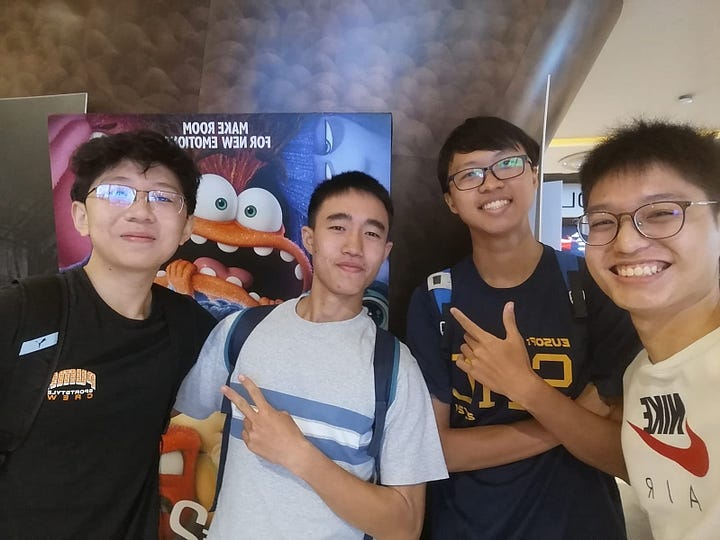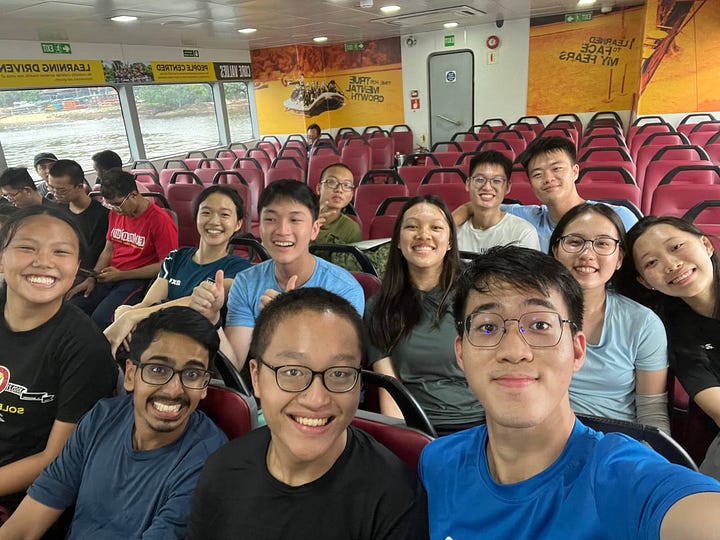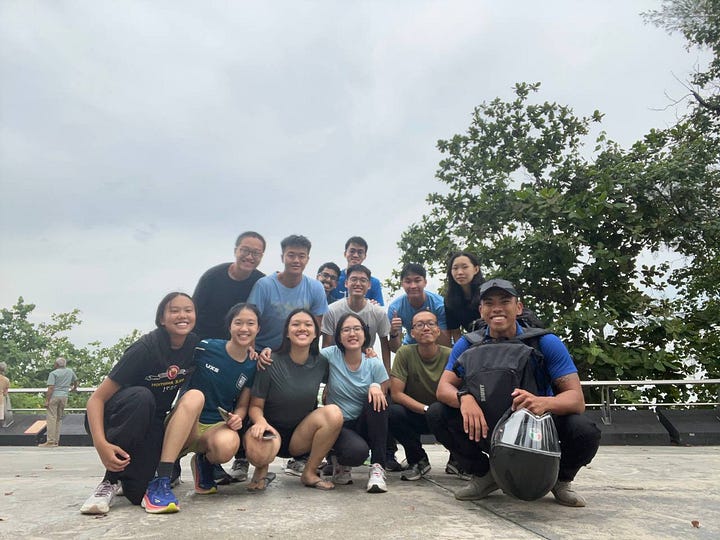How to make millions before grandma dies is a story about family, money and death. It is a film so powerful, because it is ultimately a reflection of life.
Family
M is a 22-year old bum. He is shown wasting his youth away live-streaming video games and subsisting off his mother (much like the 躺平 youth in China). He barely visits his grandma’s house on Sundays and cares little for his family.
Mui is M’s pretty cousin. She studied as a nurse and chooses to take care of her ailing but wealthy Agong in a bid to inherit his large house. He is frail and confined to a bed. He then chokes to death and Mui becomes a (baht) multi-millionaire. She sells the house, moves to a hotel and earns cake money on OnlyFans. Mui later confides in M, saying that she knew how to save Agong but chose not to. Though she says that Agong was in so much pain and wanted to die, she is evidently wrought with guilt. Mui is the epitome of moral bankruptcy.
M’s mother is the daughter of Amah, the grandma in the show. M’s mother is a poor single mother. She works as a supermarket cashier and nurse. She takes on more than her fair share of filial duties and is obviously worn out.
Amah has two other sons. The first-born is a bespectacled man who is conventionally successful. He trades shares and has a very big house. He married a posh woman who insisted that their 5-year old daughter attend an international school. The daughter does not speak Teochew (the language of the Thai Chinese), but speaks English.
The youngest child is a good-for-nothing failure. He is a gambler and alcoholic, mired in debt. He only visits Amah to plead for cash and debtors often visit Amah, looking for him. He is later shown stealing Amah’s life savings. He represents the prodigal son; the only difference is that he is never remorseful, even by the end of the film.
And there is Amah. She represents the goodness of humanity. She sells congee every morning and insists on doing so, even after her diagnosis with cancer. For her son’s good health, she prays to Guanyin and gives up beef, though it was her favourite food. She insists on wearing shoes that were purchased by her first-born, though they are too small for her. And upon finding out that M’s mother switched to the night shift to bring her for medical appointments in the day (and M’s mother will have very little sleep), Amah insists that M’s mother switch back to working in the day.
The divergence in fates among family members is a reality. Oftentimes, some do better than others. Some become detached from, or are even embarrassed of their family. Others are burdens on their family. And many support other family members, toiling away silently.
Though the movie takes place in Thailand, any Singaporean could have related to the depiction of a flawed and broken family. Even if we are fortunate to have good families, we can easily feel the pain that other families go through.
Money
Amah is given a year to live. Inspired by Mui’s exploits, M sets his mind on caring for Amah till she dies as a quick way to earn a lot of money. He then moves in with his grandma.
Other family members become suspicious and guarded. They are also interested in inheriting Amah’s house and start to visit Amah more. The eldest son even coaxes Amah to live with him, where there is air-con, a hospital bed and Chinese opera. In fact, the eldest son tries to pay M off in an attempt for M to stop caring for Amah, to which M declines and says “I’m not doing it for money”.
While family members are hesitant to inform Amah of her cancer, she finds out through M and starts treatment, waking up at 4 a.m. every day to queue at the hospital. Yet, chemotherapy does not work and her condition deteriorates. She becomes more reliant on M and is in greater pain.
Sadly, Amah also becomes more depressed. She has dreams that her parents are calling her to heaven and reveals that the saddest day is the day after Chinese New Year, when “there is so much leftover food in the fridge and no one to eat it with”.
At the turning point of the film, Amah visits her wealthy elder brother. While she lovingly dances with him, when she privately asks her elder brother for money to buy a burial plot, the elder brother becomes angry and refuses. She protests that the elder brother inherited the house from their parents and therefore became rich, while she received nothing. Yet, she had never asked her elder brother for anything till now. The elder brother tells her never to see him again.
One day, M finds her in great pain; Amah cries that she wants to die. Her time is near, and is rushed to the hospital to manage her pain. Amah decides to transfer her house to her youngest son, who is now able to clear his debts and puts her in a nursing home. The other family members (apart from M’s mother) cannot understand why; the first-born says that he would not attend the funeral and M asks Amah why he was not her “number one”. Amah cannot respond and tears up.
Yet, M has come to love and appreciate Amah, and regrets what he did. He takes Amah out from the nursing home and brings her back home. He sings a lullaby that she used to sing to him as a child, holding her hand. She has nothing left to offer and is deeply touched. She then passes on.
Upon reflection, I guess love is irrational, perhaps even unfair. Even though the youngest child never once cared for Amah, he needed the house and received it. Though M’s mother had bore the heaviest caregiving responsibilities, she often felt neglected. In fact, she states matter-of-factly, “Sons inherit the house. Daughters inherit cancer.” Yet, in retrospect, M’s mother feels best giving and not receiving, and is the most emotional one when Amah dies.
Money can never fully compensate for the sweat and tears that goes into a relationship. It can also never replace time. Money is immaterial, relative to the care and attention that we receive unconditionally from our parents and loved ones. Yet, due to our short-sightedness, money often divides and we lose our sense of self.
At the end of the film, M receives a call from the bank. He realises that Amah has secretly been depositing her savings in a bank account for him since birth, and is now a baht millionaire. Nonetheless, he chooses to use the money to honour Amah by buying a burial plot, knowing how important it was to her to have a proper burial place and having promised to buy Amah a ‘home’ as a young child.
This was the moment when everyone started to cry. M had, for the first time, made a truly selfless decision. It represented genuine love, the triumph over personal gain and the thirst for money.
Death
Of course, the movie is also about impending death. Amah takes the news of her cancer diagnosis as calmly as she can. She even jokes about her illness with her elderly friend who also had cancer at first.
Yet, as her death nears, she becomes more weary and fearful. She worries for her children. As a religious person, she also worries for herself. The anticipation of death had changed who Amah was completely.
A friend said that we do not think about death now since most of our life’s milestones have not happened. As a single guy who has not started work and who hasn’t had children, death seems really far away. Yet, if we were told that we had a terminal illness and would die soon, how would we react?
I remember the death of a schoolmate in primary school. Though we were never classmates, we knew each other personally. He was an active basketballer, but was diagnosed with cancer at the age of eleven. I saw less of him, and a year later, he passed on. Though I have thankfully not experienced the deaths of other friends or family members since then, I am constantly reminded of life’s frailties.
Sadly, Amah died, knowing that her children did not truly love her and with quite a fair bit of regret. She would have died feeling abandoned by most of her family and not expecting to have a proper burial place. That is perhaps the tragedy of the movie, in spite of M’s redeeming growth.
I hope that I would die surrounded by family and maybe friends. Even if I may not be wildly rich and may not have achieved much in life, I hope that I would at least have the assurance of closely-held relationships and that I can die without much worries for my children.
Conclusion
I remember how hard Dylan cried towards the end. I teared up during the final scene as well, when the coffin makes it way around significant places that Amah frequented: the river around where Amah used to walk with M as a young grandson, her congee stall, the train station, all the way to the burial site where she paid respects to her parents during Qing Ming.
I feel that the movie was especially powerful for me because it brings together the most touching scenes that I know of.
I remember watching this filial piety ad on TV (which ran before Okto’s One Minute of Fame, a programme I performed on as a kid). It features a son singing a lullaby to his elderly mother, just as the mother once sang the song for her son when he had a fever.
I also watched 阿妈定位系统 (or Grandma Positioning System), a short film in 7 Letters, a collection of short films created to celebrate Singapore’s 50th birthday. It shows how an elderly grandma recounts the way from Malaysia down the Bukit Timah railway track to their home to her late husband, every year at his grave. After the grandma passes on, her grandson takes over and recounts the way back home to both of his grandparents. Then this song plays, as old pictures of demolished landmarks along Bukit Timah are shown.
And there is 你好,李焕英 (or Hi, Mom). It features a child who has already grown up, but who feels that she has not done her Mum proud. The Mum is involved in a car crash, and the child is brought back to a time when the Mum was much younger. She tries to help her Mum to marry a rich guy to change her mother’s fate of poverty and mediocrity but to no avail. The child breaks down, to which her Mum says that her child is happy and healthy and that is all that she wanted. The child reflects on the sacrifices that her Mum had made for her and cries loudly; alas, her Mum passes away then.
I also feel guilty for not spending much time with my grandma nowadays, even though she took care of me when I was younger. I will probably spend more time with her.
Long read tonight, and thanks so much for reading yea :))









Chapter 0: The Rebuttal
How to make grandma was just one of those cinematic masterpieces that will stick with me for a long time. Your analysis of the themes of How to make millions of grandmas were insightful. But i would have to disagree with your analysis of love in the movie, namely how Amah’s love for her children is “irrational” and “unfair”.
Maybe saying i “disagree” with your analysis is a bit too strong. I do concede that the youngest son - Soei, is least deserving of the house, and Amah’s decision to give him the deeds was indeed irrational and unfair. But these descriptors of Amah’s brand of love is incomplete. I think a better adjective for Amah’s love would be this: unconditional.
Chapter 1: Unconditional Love
Unconditional Love is in my opinion one of the central themes of the film. M’s love for Amah initially came with a price tag, but throughout the course of the movie, this price tag was slowly peeled off, revealing a selfless, no strings attached brand of love.
And it isn’t just M’s love for Amah. The love Amah showed her family is also the same. Her letting Soei inherit her house is the most obvious proof of this, but what I want to focus on is her love towards her grandson.
Chapter 2: Premonition
I remember telling Darr Darr how i had called it: that Amah would secretly have a stash of cash on the side, and that it would be rewarded to the one who still decided to stay by her side despite her having nothing more to give. I mean it would have been so fitting, for the director to reward the character for showing love without expecting anything in return. However, i remember thinking that such an ending would have sullied the message, as the sum of money wouldn’t have been out of Amah’s love, but a calculated repayment for someone else’s care.
That’s why when the reveal of Amah having saved up a million baht for M happened, i cried. (I didn’t want to have to say it, so thanks Darrius for telling the whole world). M’s claim to the money wasn’t contingent to him taking care of Amah, or taking her home to stay with him. No, it was just simply cuz Amah loved him. A selfless, unconditional love.
Chapter 3: Conclusion
I really have so much more i want to say about this movie, but I just can’t put it in words. Let’s just say this movie was the closest i ever came to starting my own blog post, something past me would’ve sworn i’d never do. Maybe we can chat about this movie when we meet again.
The end.